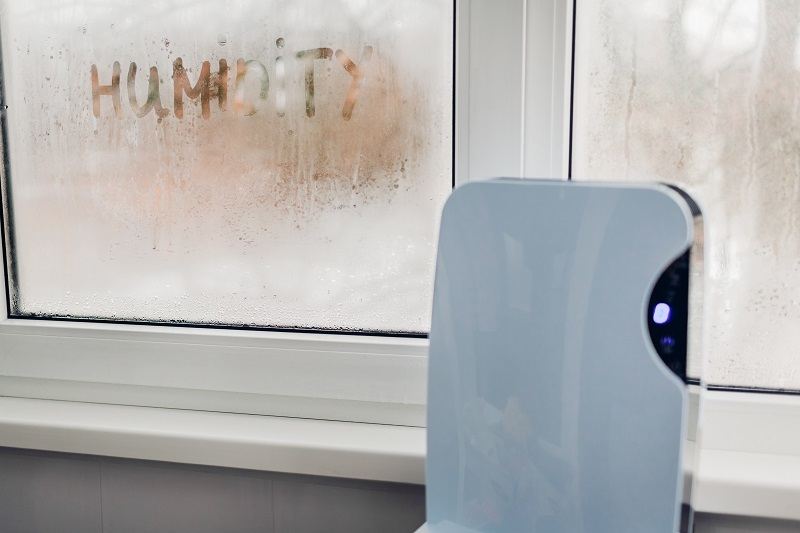A recent rise in popularity has brought dehumidifiers to the spotlight.
People have begun relying on them to make their homes more livable and enjoyable.
It can't be denied that dehumidifiers are helpful devices in certain homes.
However, there is a bit of confusion related to dehumidifiers' specific function concerning generating cold air.
People sometimes get them confused with air conditioning units.
So, can a dehumidifier cool a room?
Or do dehumidifiers help air-condition blow cold air into the home?
This guide will answer all of your questions.
What Can Dehumidifiers Do For You?
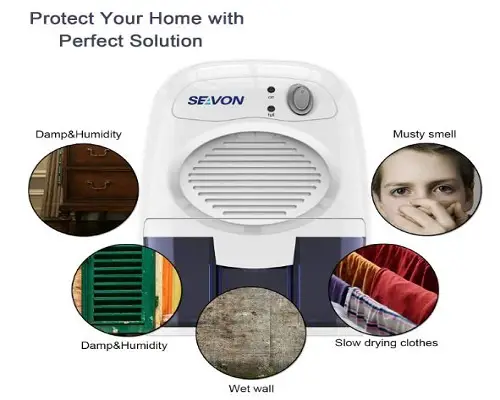
Dehumidifiers have a significant number of practical benefits. They work to decrease the amount of mold and moisture in a home; they enhance the air quality and assist individuals with asthma, and they keep houses feeling dry and comfortable.
There are lots of designs and types of units that may be bought so that individuals can have more choices.
It's up to you, the homeowner, to determine which model will best satisfy their requirements.
OK, so do dehumidifiers provide cold air?
Dehumidifiers aren't the same as ACs and shouldn't be confused.
Air conditioners are heat exchange units used to remove heat from ambient air to generate cold air and cycle it throughout the home.
On the other hand, dehumidifiers decrease the humidity levels of a home.
How Dehumidifiers Work
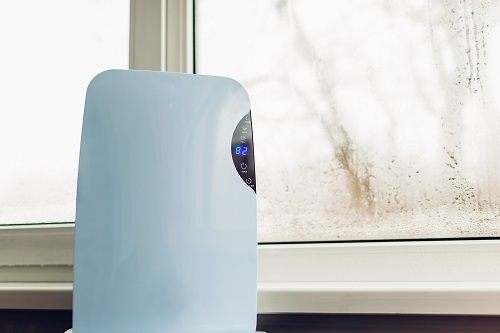
Dehumidifiers take moist, warm air from your home and eliminate the humidity from it.
Humidity creates that heavy, muggy feeling in the air that you might have experienced.
Technically, humidity is the amount of water vapor in the air.
The issue with high humidity is that everything that comes in contact with humid air can get damp and uncomfortable.
Humidity is particularly harmful inside homes. This is because it can cause so much damage. High humidity can lead to mold growth, which gives the house a lingering musty odor.
Humidifiers work by sucking in humid air from within your home then pass through a fan. After this happens, the moisture in the atmosphere is removed by the machine's cooling coils by condensing the water vapor into liquid form.
The collected droplets then drop into a bucket in the dehumidifier, which will have to be emptied.
Some models can immediately send the moisture into a sump pump and out of your home via a hose.
So, as you can see, a dehumidifier doesn't produce cold air, but it will help to cool a space by removing water from the air.
Does A Dehumidifier Help With Air Conditioning?
The reply to this question is yes, dehumidifiers will help your air conditioning system perform better.
When a dehumidifier eliminates the humidity from the air, drier air is left to cool and dry.
When the air conditioner is switched on, it'll be much easier to cool air that's already dry.
If you use a dehumidifier to maintain dry air, there will be less demand for the air conditioner.
And if you don't have to use your air conditioner as often, you will save on your energy bill.
You'll also save on maintenance since the system will have less wear and tear.
Another great thing about using a dehumidifier is that it consumes less power than an air conditioner.
Condensation
Checking to see if you need a dehumidifier is easy.
Usually, you would begin by checking for virtually any sort of moisture damage in your house, if it is quite noticeable or nearly hidden. This might consist of a water stain on the ceiling, condensation on the windows, or doors that stick when you try to shut them.
Another way is by simply measuring how comfortable you feel being in the house.
If you decide that the weather is humid enough to justify running a dehumidifier, you'll find a feeling of relief when you feel the dry air.
Exceptions: When Not To Get A Dehumidifier
If you live in a climate with a great deal of humidity, running the dehumidifier will surely help you and help keep your house cool.
But if your climate is especially hot and dry, it might be damaging for you to have a dehumidifier running. This is because a dehumidifier generates heat to function.
Eliminating humidity from the air will cause the dehumidifier, and therefore your house, to warm. It would be advisable to just run the air conditioner rather than the dehumidifier in cases like this.
If you decide that running a dehumidifier is too much of a strain on the power bill, there are other options you can look at.
You can buy a smaller portable dehumidifier, for example. These dry one one room, rather than the entire house.
Another alternative is to leave your windows open at night, allowing cold air in.
Then you can shut them in the early hours, when the sun starts to heat the home.
Tips
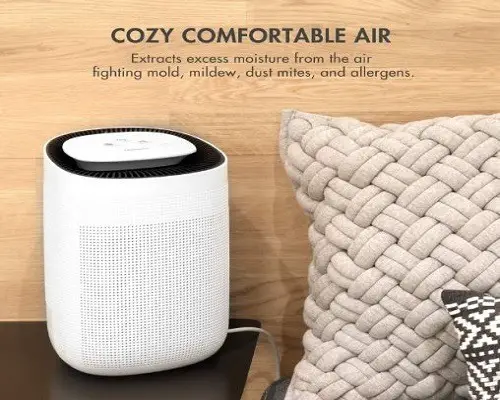
When buying a dehumidifier, make sure it is sized for the square feet of the room(s) you need drying.
By way of example, a room that's 500 square feet will need a dehumidifier that can eliminate 1.6 to 1.8 gallons of water daily.
Buy a dehumidifier that work well in your area's climate, too.
Example: low-temperature dehumidifiers are designed for temperature ranges of 65 degrees Fahrenheit or lower.
Most standard dehumidifiers work great when temperatures are 70 degrees or greater and lower the room's humidity by 35 to 40 percent.
Keep your dehumidifier from"icing up" by increasing the room's temperature or moving the appliance to a higher, and therefore warmer, place.
Working With Other Climate Appliances
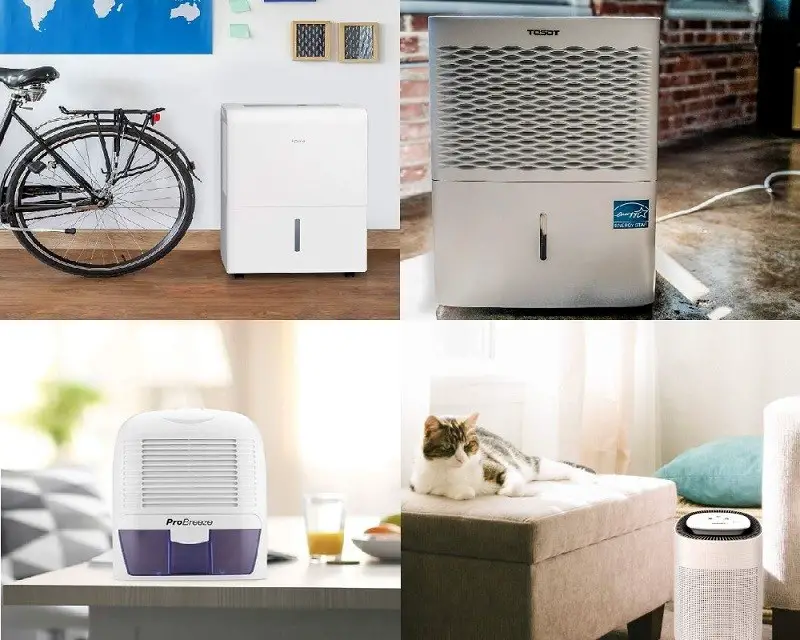
Use your dehumidifier, air conditioner and ceiling fans together to produce an optimal cooling impact.
Use the dehumidifier at first to change the moist air in the area to dry air.
Do not turn on the AC until the dehumidifier is completed.
Running them simultaneously will make the air conditioner run harder since the dehumidifier is a device that produces heat.
Once you turn on the air conditioner, it will not have to operate on its highest setting because dry air is much easier to cool than humid air.
Finally, use your ceiling fan to evenly disperse the cooler air.
Conclusion
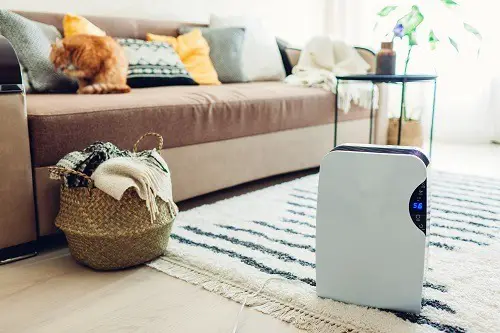
Overall, whether dehumidifiers will cool your house depends on where you live.
If the weather is warm and humid, then dehumidifiers will work to your benefit. They'll get rid of the humidity, and the heat generated will be less than if you had not used it.
If you reside in a dry / arid climate, then dehumidifiers are not a good choice because they will create more heat than they eliminate.

